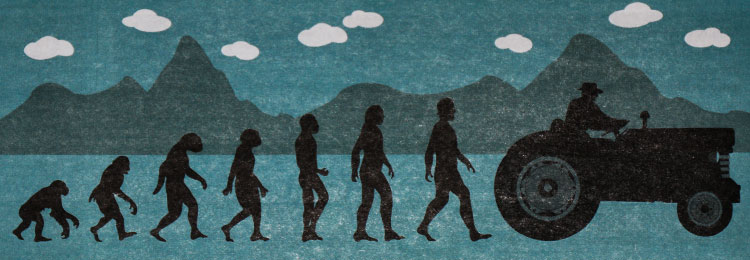
Evolution can be ruthless at eliminating the weak and there’s no doubt Darwinism is alive and well in Australian agriculture right now. It’s not the biggest that are guaranteed survival anymore, or the farmers with the best selections, but it’s those who are adapting to their environment. It’s the innovators, collaborators and visionaries that will and are, inheriting the earth.
Whilst the debate rages around the country on whether foreign ownership is good or bad for Australian agriculture and the environmentalists tackle the complex issues of climate change, some farmers are ignoring the headlines and “getting on with it”, grasping new opportunities with both hands.
Those with seemingly enterprise mindsets are growing crops never before seen on the mainland, they’re opening up new markets for their produce not just in Asia, but the America’s and Europe, others are re-imagining packaging solutions and distribution channels for their produce, and some are engineering new technologies that will transform the way future generations farm.

So the question has to be asked, why are some farmers seemingly paralysed by fear and failure and fixated only on the barriers such as the weather, the Aussie dollar, the banks, the supermarket duopoly and even the lefties impacting on their right to farm, when the prize and opportunity for Australian agriculture is here for the taking?
The answer may rest with our barriers to entrepreneurship, rather than our barriers to trade. In their latest global report on entrepreneurship covering 26,000 people and 24 countries, the Global Economic Monitor (GEM) found that Australians had an incredibly positive attitude towards entrepreneurship ranking third in the world at 84%.
But when they compared the number of respondents who showed potential to become entrepreneurs in Australia compared to those that had taken up self-employment, they found a gap of 44% (the average result for all countries surveyed was 31%).
The report suggests that the actual and perceived barriers to entrepreneurship in Australia are deterring more would-be entrepreneurs here than the average across the other 23 countries surveyed. Statistics tell us that the majority of new small businesses close within 5 years of start-up in Australia, the results in rural and regional Australia are even worse.
Sam Trethewey, Founder of AgriTech Melbourne, Victoria’s first ideas kick-starter dedicated to agriculture, believes culture is in desperate need of review in order for the ag industry to truly foster effective entrepreneurship.
"I am a big believer in ‘culture eats strategy for breakfast’. You can have the best strategies in the world, but culture is a powerful animal that can counteract and resist attempts to change,” he said.
Trethewey, a farmers son from near Geelong in Victoria believes that a Silicon Valley style cohort is vital for agri businesses to prosper and just as equally fail, in a supportive environment. He describes AgriTech as an incubator for ideas and business collaborations.
“Our ambition is to create an inspirational and supportive environment where a cross section of people from various industries, including ag, can come together, share their ideas, find partners and collaborators and mould their ideas in to something tangible,” added Mr Tretheway.
There is no doubt that entrepreneurship is not for everyone, but agriculture does have a new and emerging hive of fresh thinking, multi-skilled, well educated and credentialed business leaders, they just don’t have a platform and in many cases, the capital to enable a viable business concept.
Entrepreneurship does require resources such as labour, materials, customers, advocates and most critically capital, and perhaps this is where the biggest barrier to entrepreneurship in Australia lies.
Farm businesses in Australia may be run by an increasingly younger generation of farmers, however the transfer of wealth and therefore control is neither as planned nor as progressive as it is with most family businesses. Family Business Australia reports that 81% of business owners intend to retire in the next 10 years in Australia, generating a wealth transfer of $3.5 trillion. This is definitely not reflective of Agricultural enterprise succession.
The Governments “ideas boom” is an exciting and necessary ambition not lost on Australian agriculture, but policy to support wealth transfer of Australian farm assets, community building to embrace entrepreneurship and local leadership to ensure relevance, may just be necessary to ensure Australia’s agricultural brand continues to evolve rather than face extinction.
Check out Jim Gall’s final word in the ‘Decision Ag’ Magazine, published bi-monthly in The Weekly Times.
